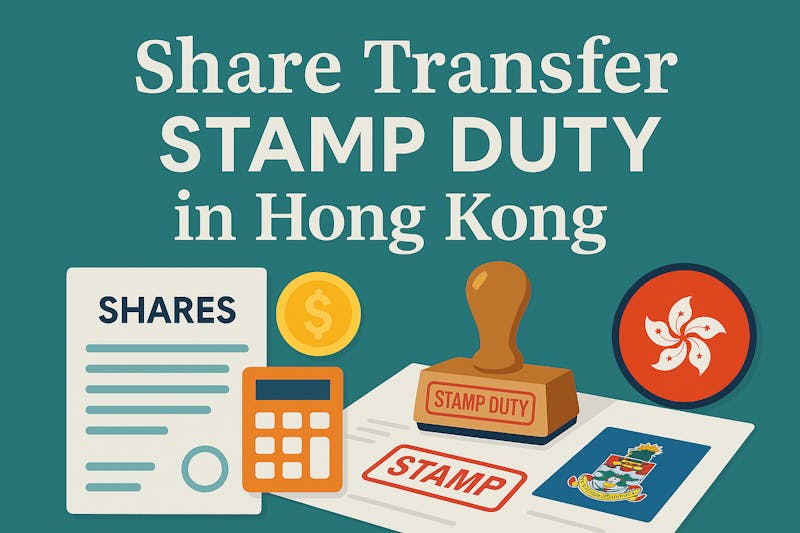Share transfers must comply with the Companies Ordinance (Cap. 622) and the company’s Articles of Association.
The current total stamp duty rate is 0.2% (reduced from 0.26% on 17 November 2023).
The IRD requires up-to-date audited or management accounts to assess the value of unlisted shares.
Late stamping penalties can reach up to 10 times the original duty.
A share transfer occurs when a shareholder sells or gifts shares to another person — such as a business partner, investor, or relative. While common, it is a legally regulated process in Hong Kong and often triggered by shareholder exits, ownership changes, or internal restructurings.
Typical reasons include:
- Allowing a shareholder to exit and recover investment
- Gifting shares to a spouse, relative, or partner
- Adjusting ownership to match new profit-sharing arrangements
- Bringing in a new investor or business partner
- Group restructuring or reorganization
No matter the reason, the Hong Kong Inland Revenue Department (IRD) imposes stamp duty on the transfer of Hong Kong company shares.
Step-by-Step: How Share Transfers Work
Under the S.11 of the Companies Ordinance (Cap. 622), private companies must restrict share transfers in their Articles of Association (AOA). These restrictions (often pre-emption rights or board approvals) must be satisfied before any transfer.
Once cleared, the process typically follows these steps:
1. Check AOA and Approvals
- Confirm or waive pre-emptive rights
- Obtain board and/or shareholder approval if required
2. Prepare Documents
- Instrument of Transfer
- Bought/Sold Notes (if a sale)
- Share Purchase Agreement (SPA) if terms are complex or involve third parties (not legally required but common)
3. Provide Documents to IRD (For Assessment):
- AOA if the company is less than 18 months old
- NSC1 if recent capital changes
- Latest audited accounts and management accounts (if audits >6 months old) within 3 months of transfer date
- Dividend resolutions (if relevant)
- IRSD102 schedule if the company or its subsidiaries hold property
The IRD may request the latest NAR1 if the company is over 18 months old.
4. Stamping
- Submit via GovHK e-Stamping. The stamp certificate issues instantly after payment.
5. Update Company Records
- Enter transfer in the register of members
- Cancel old and issue new share certificates
- Update Significant Controllers Register (SCR) if applicable
- No separate Companies Registry filing is needed; transfer appears in the next Annual Return
How the IRD Determines Share Transfer Value in Hong Kong
When calculating stamp duty on a share transfer, the Inland Revenue Department (IRD) assesses the higher of the consideration paid or the fair market value of the shares. The method depends on whether the shares are listed or unlisted.
Listed Shares
For shares traded on the Hong Kong Stock Exchange (SEHK), the IRD uses the closing price on the last trading day before the transfer as the benchmark value.
Unlisted Shares
For private companies, the IRD generally adopts the Net Asset Value (NAV) shown in the latest audited accounts.
- If the accounts are outdated, the IRD may request updated management accounts.
- A property valuation schedule may also be required if the company holds significant real estate assets.
Why This Matters
Correct valuation ensures stamp duty is assessed accurately and avoids IRD disputes. Parties involved in private share transfers should prepare up-to-date financial statements and property details in advance.
Stamp Duty on Share Transfers in Hong Kong
Stamp duty is payable to the IRD on any transfer of Hong Kong company shares (sale, gift, or restructuring). Stamping is required before the change of ownership takes effect.
Current rate (effective 17 Nov 2023)
- Ad valorem duty: 0.1% on the Sold Note + 0.1% on the Bought Note = 0.2% of the higher of the consideration or value
- Instrument of Transfer: HK$5 fixed duty
Who Pays?
Under Hong Kong law, stamp duty on share transfers is split as follows:
- 0.1% on the Bought Note (buyer’s liability)
- 0.1% on the Sold Note (seller’s liability)
This means the legal obligation is shared between both parties.
Although the law assigns separate duties, in practice, it is common for buyers and sellers to agree to split the total 0.2% cost equally. This is a matter of commercial negotiation and not a statutory requirement.
Legally, each party is responsible for their own 0.1%, but agreements may shift or share the burden depending on the deal structure.
Gifts of Shares
- No contract notes
- Instrument of Transfer: HK$5 + 0.2% of the fair market value
Examples
Sale (unlisted shares):
- Sold Note = HK$10,000,000 x 0.1% = HK$10,000
- Bought Note = HK$10,000,000 x 0.1% = HK$10,000
- Instrument = HK$5
- Total = HK$10,000 + HK$10,000 + HK$5 = HK$20,005
Gift (unlisted shares):
- Ad valorem duty = HK$5,000,000 x 0.2% = HK$10,000
- Instrument = HK$5
- Total = HK$10,000 + HK$5 = HK$10,005
Stamping Deadlines & Penalties
| Document | Deadline |
|---|---|
| Contract note (HK stock, executed in HK) | Within 2 days |
| Contract note (executed outside HK) | Within 30 days |
| Gift of HK stock | Within 7 days (HK) / 30 days (outside HK) |
| Instrument of Transfer (other transfers) | Before execution in HK / Within 30 days (outside HK) |
Late Penalties
If stamp duty is not paid on time, the IRD may impose penalties:
- Up to 2× the duty if the delay is less than 1 month.
- Up to 4× the duty if the delay is between 1 and 2 months.
- Up to 10× the duty if the delay is more than 2 months.
Stamp Duty Reliefs in Hong Kong
When transferring shares, certain reliefs under the Stamp Duty Ordinance (SDO) may reduce or remove the duty.
Intra-Group Relief (s.45 SDO)
Share transfers between companies that are 90% commonly owned may qualify for exemption.
Following a 2025 Court of Final Appeal ruling, relief applies only to bodies corporate with issued share capital. Some structures such as LLPs and LLCs may not qualify.
Stock Borrowing and Lending Relief
Stamp duty relief may also be available for stock borrowing and lending arrangements, provided all statutory conditions are met.
Conclusion
Transferring shares in a Hong Kong company is a straightforward but regulated process. Getting the valuation, documents, and IRD stamping right is crucial to avoid penalties and delays. With the 0.1% x 2 + HK$5 duty rule now firmly in place, businesses can budget with certainty.
Air Corporate can help streamline the entire process — from checking your AOA to handling IRD stamping and record updates. Talk to our experts today and make your share transfer in Hong Kong smooth and compliant.
FAQs
No. Transfers can be validly completed with an Instrument of Transfer and contract notes, subject to AOA approvals. An SPA is common but not required.
With e-Stamping, the certificate issues instantly after payment. Timing depends on how quickly accounts and approvals are prepared.






